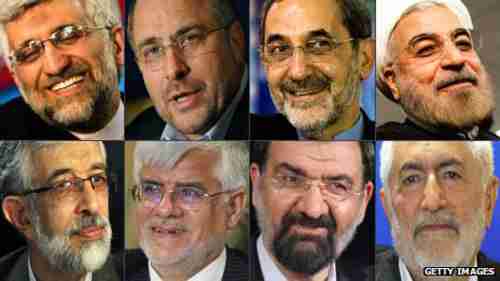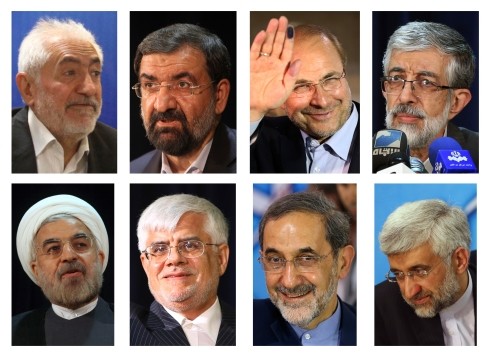
This morning’s key headlines from GenerationalDynamics.com
- Iran’s Supreme Leader tries to defeat the younger generation
- Charges of sorcery
- An ideological and generational assault
Iran’s Supreme Leader tries to defeat the younger generation

Iran’s eight approved candidates (BBC)
In a stunning generational assault, Iran’s Guardians Council hasfollowed the wishes of the Supreme Leader Ayatollah Ali Khamenei andhas disqualified all presidential candidates who do not followKhamenei’s hardline ideology. With a new presidential election comingnext month, the council disqualified two major candidates who areconsidered “centrist” or “reformist.”
The most colorful rejection was of Esfandiar Rahim-Mashaei, the topaide and close friend of current president Mahmoud Ahmadinejad.Ahmadinejad and Khamenei have had bitter power struggles for the lastfour years, related to a widening theological dispute. (See “7-May-11 News — Resignation of Iran’s president Mahmoud Ahmadinejad may be imminent”.)
Charges of sorcery
In 2009 Khamenei accused Mashaei and other Ahmadinejad aidesof being sorcerers, of using “supernatural powers,” and ofbeing “magicians” and invoking djinns (spirits).
The charges of sorcery are related to the devout belief, held byAhmadinejad and Mashaei, in the Mahdaviat — the Shia Muslim beliefthat the Mahdi (or “the 12’th Imam” or “the Hidden Imam”) is coming tosave mankind. This belief is roughly equivalent to the Christianbelief in the second coming of Christ, or the Buddhist belief in theMaitreya — that a new Buddha is to appear on earth, and will achievecomplete enlightenment. Ahmadinejad disobeyed Supreme Leader Khameneiin several matters, which is considered to be equivalent to disobeyingGod. But Ahmadinejad was just paving the way for the return of theHidden Imam, and was using his claim that the Hidden Imam’s return isimminent as a justification for disobeying Khamenei. Thus, thecharges of sorcery.
But the disqualification of Mashaei as a presidential candidatemay have occurred for far more prosaic reasons. Mashaei isvery outspoken on issues of individual rights and personalfreedoms, particularly for women. These are all views thatare firmly rejected by the hardline Khamenei.
Similarly disqualified was former president Ali Akbar HashemiRafsanjani, who intensely dislikes Ahmadinejad and Mashaei, but whohas also criticized the Khamenei supporter for suppressing freespeech, and crushing the protests in 2009, and has advocated betterrelations with the West.
Iran is in a generational Awakening era, like America in the 1960s.America in the 1960s was a political battle between the oldergeneration, the hardline survivors of World War II, versus theyounger “free thinking” generation that grew up after WW II.Iran today is in a political battle between the older generation,the hardline survivors of the Great Islamic Revolution of1979 and the following Iran/Iraq war, versus the youngerfree thinking generation that grew up since the 1980s.
An ideological and generational assault
So Khamenei’s move to disqualify the centrist and reformist candidatesis both an ideological assault and a generational assault. It’s adesperate move, as Khamenei sees his hardline ideology being eatenaway by younger generations who think it’s perfectly OK for a woman towalk down the street without a head scarf. Sooner or later there’llbe an “Awakening era crisis” which, like President Richard Nixon’sresignation in 1974, will settle the generational battle one way oranother. In the meantime, disqualifying all the reforming andcentrist candidates is pretty certain to infuriate the youngergenerations. BBC andAFP
Permanent web link to this article
Receive daily World View columns by e-mail

COMMENTS
Please let us know if you're having issues with commenting.